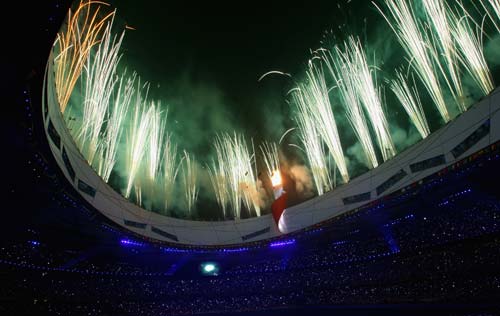Your support helps us to tell the story
From reproductive rights to climate change to Big Tech, The Independent is on the ground when the story is developing. Whether it's investigating the financials of Elon Musk's pro-Trump PAC or producing our latest documentary, 'The A Word', which shines a light on the American women fighting for reproductive rights, we know how important it is to parse out the facts from the messaging.
At such a critical moment in US history, we need reporters on the ground. Your donation allows us to keep sending journalists to speak to both sides of the story.
The Independent is trusted by Americans across the entire political spectrum. And unlike many other quality news outlets, we choose not to lock Americans out of our reporting and analysis with paywalls. We believe quality journalism should be available to everyone, paid for by those who can afford it.
Your support makes all the difference.China has still not decided whether to build on the huge success of the Beijing Olympics by launching a bid for the 2018 or 2022 World Cup finals, the China Football Association (CFA) said today.
Fifa is expected to announce the bid procedure for both tournaments later today with a joint bid from Belgium and the Netherlands already formally declared. England, the United States, Mexico, Spain and Australia are also likely to bid.
"We have no announcement to make about whether we will bid or not at present," CFA spokesman Dong Hua said earlier.
"Hosting the World Cup finals would be a very good thing for China. It's a long time aspiration of Chinese fans and the Chinese football community but it needs a lot of thought about all aspects before we make a decision."
A China bid is likely to have a good chance of succeeding given the desire of many in the international soccer community to tap the Chinese market, as well as the legacy from August's Olympics and the 2007 women's World Cup.
Beijing, which is likely to form the centre of a bid, has two major stadiums. The new 80,000 capacity Bird's Nest served as the centrepiece for the Olympics while the refurbished 64,000-seater Workers Stadium is the traditional home of Chinese soccer.
Tianjin (capacity 54,000), Shenyang (60,000) and Qinhuangdao (31,000) all built arenas to host soccer matches at the Games, while Shanghai Stadium (56,000) was also re-fitted for the FIFA organised tournament.
Shanghai's other main arena, the Hongkou Football Stadium (33,000), was the venue of the women's World Cup final last year, while stadiums in Chengdu (42,000), Hangzhou (51,000) and Wuhan (60,000) also hosted matches.
There is also a legacy from the experience of coping with the logistics of hosting an Olympics, the only sporting event larger than the World Cup finals.
The downside is the moribund state of the game in China.
The national team are a laughing stock, while the top flight Chinese Super League (CSL) produces a low grade product to dwindling audiences and has long been perceived as byword for corruption.
Earlier this month, thousands of Wuhan Guanggu fans marched through the central city and some charged a police blockade in protest against an eight-game ban for former China captain Li Weifeng.
Li's club have since withdrawn from the CSL and threatened legal action over what they considered an overly stiff punishment for the central defender, who had scuffled with a Beijing player.
On Tuesday, Liaoning fans smashed the windows of the Shenzhen team coach after a 2-1 defeat in a relegation six-pointer in the provincial capital Shenyang.
China has only played at the World Cup finals once in 2002. After getting through a qualifying stage weakened by the absence of South Korea and Japan, who co-hosted the finals, they lost all three matches without scoring a goal.
They were knocked out of the Asian qualifiers for South Africa 2010 earlier this year and the Olympic team failed to advance beyond the group stage at the Beijing Games in August.

Join our commenting forum
Join thought-provoking conversations, follow other Independent readers and see their replies
Comments